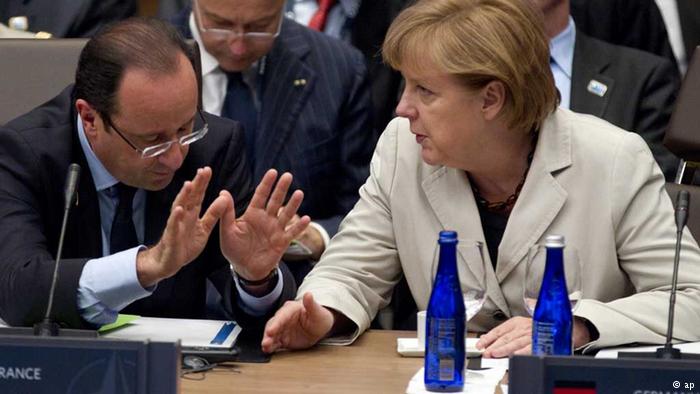The Greek crisis has considerably widened the gap between the EU Member States and this is likely to continue. As was stressed after the bitter “commitment” on the morning of 13 July, only France and Italy, as well as Cyprus, strove to “save Greece”, preventing the “Grexit” which Germany and others, possibly fed up with endless European summits, more or less openly encouraged. The cracks are not, therefore, only “north-south” or “east-west”, but also dangerously affect the fundamental basis of the EU itself.
Looking back, after three disastrous wars in 75 years, Germany and France decided, after 1945, to bury the hatchet once and for all. This took shape through the creation of the European Communities from 1957, and the Treaty of Elysée in 1963, signed by De Gaulle and Adenauer to promote friendship between “hereditary enemies”: a basic balance between certain political primacy, agriculture and postcolonial ties with Africa for France, and industrial strength combined with political discretion and a strong European commitment, as well as a transatlantic one, for Germany.
The cracks are not, therefore, only “north-south” or “east-west”, but also dangerously affect the fundamental basis of the EU itself.
This was the original crucial foundation for a Community which was to grow over time from 6 to 28 members. Regular bilateral summits, special institutions to multiply student exchanges and other initiatives, actually achieved significant rapprochement between France and Germany, although both still generally ignore the language of their neighbours.
But German reunification and enlargement towards the East have unbalanced the old “Paris-Bonn axis”, this quickly becoming “Paris-Berlin”, putting an end to the situation of “economic giant and political dwarf” of the country whose capital moved from the shores of Rhine to near the Polish border. Enlargement of the EU moved its centre of gravity from Belgium to Germany which, after the difficult absorption of the former GDR, became the industrial and commercial star of the enlarged Europe, with a strong presence in the new member states.
Reflecting its competitiveness in recent years, Germany accounts for nearly half of EU exports to China but only a fifth of its imports from the Middle Kingdom, with which France, Spain and other states saw their bilateral deficit grow. While unemployment increased in these countries, in Germany it fell noticeably, and while these countries posted strong overall trade deficits, the German trade balance boasted huge surpluses which eventually beat the 6% mark of GDP. After years of the figure as “the sick man of Europe”, Germany now appears to be, more than ever, its dynamic engine.
Does this mean that Germany is truly an example to follow, even for its nearest ally across the Rhine? In fact, its strength is to some extent a consequence and cause of the weakness of its partners and the resulting relatively low level of the euro, which was brought in at the time by the French desire to bring a reunified Germany closer to the EU, however without any progress towards the greater political integration proposed by Germany. But German weaknesses are also themselves noticeable, particularly the lack of public investment, increasing poverty and demographic decline, nor is the integration of East Germany, which has lost considerable population, a resounding success. The total German population also began to fall, and a sharp drop is anticipated by 2050, only partially offset by significant immigration, which, on the other hand, causes xenophobic tensions.
Germany’s strength is, to some extent, a consequence and cause of the weakness of its partners and the resulting relatively low level of the euro.
Accelerated ageing also favours conservative and unsupportive political attitudes towards both future generations and EU member countries affected by the endless euro crisis. The search for quick “mercantilist” profit is also prevalent: the French foreign minister complained after a visit in Teheran from the German vice chancellor, heading a numerous industrial delegation, when the ink had barely dried on the long-negotiated international treaty with Iran. It is true, however, that this same French minister did not take long to follow in his footsteps, since business is business, and Iran is a tempting market…
France, meanwhile, did not set down the Keynesian and social democratic reorientation of the EU, which was expected of Hollande and this helped fuel internal dissension in the Socialist Party and put it in an increasingly subordinate position vis a vis Germany. France’s economy is not as badly off as the mainstream often claims: the economist, Paul Krugman, critical of Germany, emphasizes that supposedly model countries like Finland, have more acute problems than France, but there are undoubtedly numerous structural rigidities limiting its international competitiveness. Companies continue reluctant to invest, despite all the new measures that support them. Unemployment, especially youth unemployment, is not falling, partly because of the relatively high birth rate that brings some 130,000 young people into the labour market annually, and overall performance is not good. All this generates acute tensions in the PS itself and major frustration among young people, making Hollande’s re-election in 2017 unlikely and enabling the populist right vote to rise to 25-30%.
The latest Greek episode also provoked an open crisis between the German Chancellor, inclined towards a somewhat flexible attitude, and her Minister of Finance, strongly adverse to an unorthodox vision. This is somewhat paradoxical since the minister, originally from south-west France, is an old “pro-European” Francophile, while his boss, a native of eastern Germany, has little sensitivity in this área.
Until we see greater flexibility in Berlin, and consequently in Brussels, towards changing economic recipes, the crucial “Franco-German axis” will remain in danger of breaking, and with it the whole complicated question of European integration
The new French proposals, pointing to an “economic government” for the Eurozone, could theoretically initiate change when faced with the failure of European policies in recent years, and not just those relating to Greece, now turned into a protectorate with no prospects. But until we see greater flexibility in Berlin, and consequently in Brussels, towards changing economic recipes, the crucial “Franco-German axis” will remain in danger of breaking, and with it the whole complicated question of European integration…
Jacques Delors, with the wisdom of his recently won 90 years of age, regrets that France hesitates to share more sovereignty and Germany more risks. Because without a better understanding between the two in this direction, he thinks, it will be impossible to set the EU off again on a much-needed more realistic, dynamic, democratic and united track.
 Viktor Sukup is a European and International Affairs and analyst as well as a regional integration expert. He is a former professor of international economy at the Universidad de Buenos Aires during the 1990s and civil servant at the European Commission between 2000 and 2012. He is the author of “Europe and Globalisation”, Buenos Aires, 1998. Additionally, he serves on the board of the Club de Roma/Bruselas.
Viktor Sukup is a European and International Affairs and analyst as well as a regional integration expert. He is a former professor of international economy at the Universidad de Buenos Aires during the 1990s and civil servant at the European Commission between 2000 and 2012. He is the author of “Europe and Globalisation”, Buenos Aires, 1998. Additionally, he serves on the board of the Club de Roma/Bruselas.


